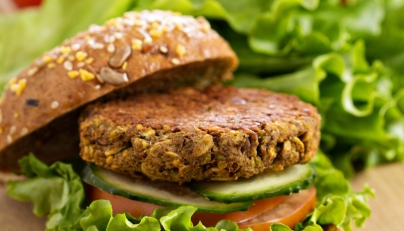Business
EU Parliament Votes to Ban Meat Terms for Plant-Based Foods

The European Parliament has voted to prohibit the use of meat-related terms such as “burger” and “steak” for marketing plant-based products. This decision, made on March 15, 2024, saw 355 lawmakers in favor and 247 against during a plenary session in Strasbourg, France. The proposal aims to address ongoing tensions between traditional livestock farmers and the growing plant-based food sector.
The legal proposal now awaits negotiations with the 27 member states of the European Union before it can take effect. This move comes as consumers increasingly shift toward vegetarian and vegan diets, driven by concerns over animal welfare and the environmental impacts of livestock farming.
Farmers Support Labeling Changes
Many livestock farmers, along with politicians representing their interests, view plant-based foods that mimic meat as a significant threat to their industry. Celine Imart, a right-wing French lawmaker who sponsored the amendment, expressed her stance clearly. “Let’s call a spade a spade,” she stated in an interview with AFP prior to the vote. “It’s everyone’s right to eat alternative proteins—made from plants, laboratories, tofu or insect flour. But calling it ‘meat’ is misleading for the consumer.”
Imart’s proposal restricts the labels “burger” and “sausage” to products containing meat, aiming for clarity in food labeling. This initiative received strong backing from the livestock and meat industry body in France, which sees the ban as a necessary measure to protect their market.
Opposition and Division Among Lawmakers
Despite the support from some sectors, the proposal faced opposition from the Greens and left-leaning lawmakers, as well as key players in Germany’s food industry, Europe’s largest market for plant-based alternatives. Notably, the head of Imart’s own EPP group voiced that the ban was “not at all a priority,” highlighting the division within the center-right factions.
The decision reflects broader debates within Europe about food labeling and consumer rights, as well as the impact of plant-based diets on traditional agriculture. As the proposal moves forward, discussions will continue among EU member states regarding its implementation and the potential ramifications for both farmers and consumers.
This vote marks a significant moment in the ongoing evolution of food policy in Europe, highlighting the clash between traditional agricultural practices and emerging dietary trends. As negotiations proceed, the balance between consumer protection and industry interests remains a critical focus.
-

 Top Stories3 months ago
Top Stories3 months agoTributes Surge for 9-Year-Old Leon Briody After Cancer Battle
-

 Entertainment4 months ago
Entertainment4 months agoAimee Osbourne Joins Family for Emotional Tribute to Ozzy
-

 Politics4 months ago
Politics4 months agoDanny Healy-Rae Considers Complaint After Altercation with Garda
-

 Top Stories4 months ago
Top Stories4 months agoIreland Enjoys Summer Heat as Hurricane Erin Approaches Atlantic
-

 World5 months ago
World5 months agoHawaii Commemorates 80 Years Since Hiroshima Bombing with Ceremony
-

 Top Stories3 months ago
Top Stories3 months agoNewcastle West Woman Patricia Foley Found Safe After Urgent Search
-

 Top Stories5 months ago
Top Stories5 months agoFianna Fáil TDs Urgently Consider Maire Geoghegan-Quinn for Presidency
-

 World5 months ago
World5 months agoCouple Convicted of Murdering Two-Year-Old Grandson in Wales
-

 World5 months ago
World5 months agoGaza Aid Distribution Tragedy: 20 Killed Amid Ongoing Violence
-

 World5 months ago
World5 months agoAristocrat Constance Marten and Partner Convicted of Infant Murder
-

 Top Stories4 months ago
Top Stories4 months agoClimbing Errigal: A Must-Do Summer Adventure in Donegal
-

 Top Stories4 months ago
Top Stories4 months agoHike Donegal’s Errigal Mountain NOW for Unforgettable Summer Views









